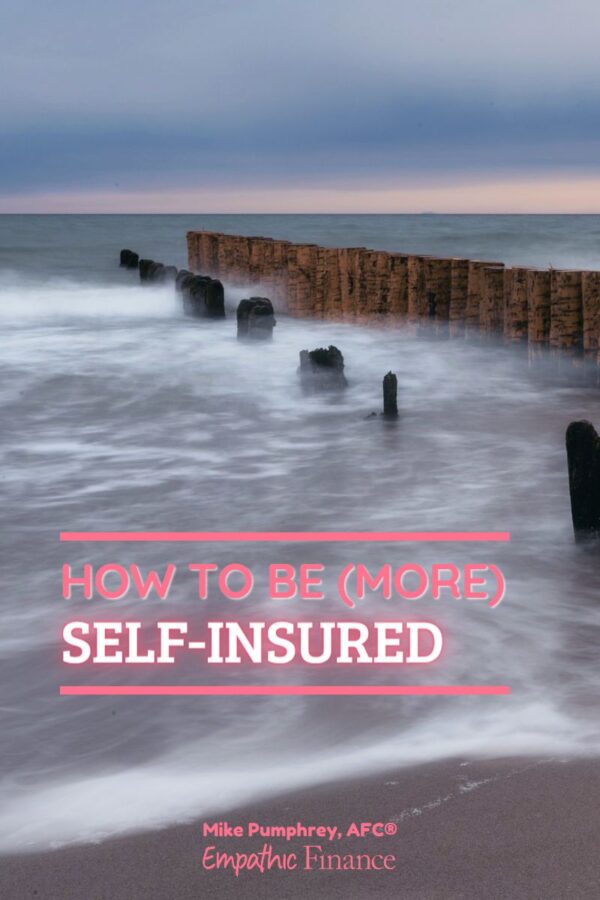You can take control over your insurance needs and your money by recognizing that you yourself can become self-insured.
Insurance is expensive, isn’t it? I know my car insurance just went up by about 15% this year, and that’s not an outlier.
Health insurance, though not as expensive as it could be, is still not cheap, especially if you’re insuring a family.
And life insurance, if you have someone (or someones) depending on you for your income, can be a fairly big hit too.
Renter’s insurance. Homeowner’s insurance. The list goes on.
While there’s never a way that you can get rid of all of your insurance payments (nor should you), if you learn to understand the role of insurance better in your life, you can make better decisions around what you need…and what you don’t.
Because in some cases, you can become self-insured. And that could save you tons.
Table of Contents
What is insurance?
Insurance, and its role in our lives, is often misunderstood.
It’s not the mafia, though it may feel like it sometimes.
Insurance, at its heart, is a method of transferring risk.
When you pay car insurance, you’re saying that in exchange for a monthly fee, you’ll transfer the risk of an unlikely but expensive event (say, a car crash) to a company. This company assumes that such an event is unlikely, but even so, prices the monthly fees such that if one were to happen, they would still come out ahead.
You get peace of mind and a small fee. They get peace of mind and the small potential of a large fee.
Health insurance works the same way, though the system is slightly more messed up than that.
Life insurance definitely works that way though. For a term plan, you pay a small fee each month, and the insurance company bets that you won’t die during that term, but still prices things such that if you do, they’ll still come out ahead. And so will you (er, your beneficiaries).
What is self-insurance?
Self-insurance is the process of being your own insurer, such that you don’t need to hire an outside firm to transfer your risk.
If you have means, this can save you lots of money.
How can you self-insure
But hold up, I’m not saying you should ditch your car insurance (that’s not legal, anyway). So what am I saying?
I’m saying that you have the ability to self-insure more than you might think.
Let’s take some examples.
- Car insurance: If you choose higher deductibles, your ongoing costs will be cheaper for the same amount of coverage, or will allow you to get greater coverage. If you have money set aside to pay that higher deductible, you have self-insured a little bit more.
- Health insurance: Similar story here. Choosing an HDHP (High Deductible Health Plan) will allow you to save lots of money on your premiums. You will, however, need to compensate by having money set aside to pay for the coverage you’re giving up. This is the self-insurance part.
- Life insurance: Contrary to popular belief, you don’t necessarily need life insurance for your whole life. If you have a $500,000 policy, and over the course of your life you put away $500,000 in assets, then congrats! You’re now self-insured and you (er, your beneficiaries) no longer need that life insurance.
Summing up
We’re always doing a little bit of self-insuring; we might just not think of it that way.
For example, any deductible you pay is a kind of self-insurance.
And in general, the more money you have in liquid assets (savings), the more you can self-insure, and the less you need to pay out in premiums.
But you don’t need or want to self-insure for everything. There’s no universe in which not having health insurance is a good idea. And car insurance is mandatory to have.
It’s just important to know that you can “adjust the levels” of your insurance, so that you can maximize your benefits and minimize any unnecessary expenditure.
You have more control than you think over the insurance companies. Especially if you become one yourself.



